5 0 0 0 OA 昆虫の味覚と摂食行動の神経基盤
- 著者
- 朝岡 潔 佐々木 謙
- 出版者
- 社団法人 日本蚕糸学会
- 雑誌
- 蚕糸・昆虫バイオテック (ISSN:18810551)
- 巻号頁・発行日
- vol.80, no.3, pp.3_151-3_162, 2011 (Released:2014-05-21)
- 参考文献数
- 72
5 0 0 0 OA 複数のトピックの時間的依存関係を考慮した時系列混合モデル
- 著者
- 佐々木 謙太朗 吉川 大弘 古橋 武
- 出版者
- 一般社団法人 人工知能学会
- 雑誌
- 人工知能学会論文誌 (ISSN:13460714)
- 巻号頁・発行日
- vol.30, no.2, pp.466-472, 2015-03-01 (Released:2015-02-03)
- 参考文献数
- 15
This paper proposes a mixture model that considers dependence to multiple topics. In time series documents such as news, blog articles, and SNS user posts, topics evolve with depending on one another, and they can die out, be born, merge, or split at any time. The conventional models cannot model the evolution of all of the above aspects because they assume that each topic depends on only one previous topic. In this paper, we propose a new mixture model which assumes that a topic depends on previous multiple topics. This paper shows that the proposed model can capture the topic evolution of death, birth, merger, and split and can model time series documents more adequately than the conventional models.
- 著者
- 安武 敦子 佐々木 謙二 志岐 祐一
- 出版者
- 一般財団法人 住総研
- 雑誌
- 住総研研究論文集・実践研究報告集 (ISSN:2433801X)
- 巻号頁・発行日
- vol.49, pp.215-224, 2023-03-31 (Released:2023-06-15)
戦後の公営住宅の不燃化の流れを整理し,1948年度に全国に展開した48型の所在や,標準型とは別に店舗付き住宅が建設されたことを把握した。さらに新聞等から地方での建設過程を明らかにした。平面計画に関しては,47型・48型は戦前の同潤会アパートの間取りに近いものの,住宅営団の日照の考えを取り入れ,48型では台所の家事動線が軽減されるなど改良が加えられている。施工については配筋間隔など高輪アパートとの差があったが大きな違いはなく,同一建物内で品質のバラツキが大きいことが確認された。またその後の規準と比較すると鉄筋が過剰に設計されていたことが分かった。
3 0 0 0 OA 社会性昆虫における繁殖制御の生理・分子メカニズム
- 著者
- 佐々木 謙
- 出版者
- 日本比較生理生化学会
- 雑誌
- 比較生理生化学 (ISSN:09163786)
- 巻号頁・発行日
- vol.27, no.1, pp.3-9, 2010 (Released:2011-04-27)
- 参考文献数
- 50
- 被引用文献数
- 1
社会性昆虫に見られる成虫期の表現型多型はカーストと呼ばれ,繁殖や巣内の仕事の効率を高めるために進化した性質であると考えられている。カーストの形態分化は幼虫期の神経・内分泌系による作用と異なる遺伝子発現を通して起こる。近年,カースト間で異なる栄養代謝系の遺伝子発現に関する研究が進み,カースト特異的な内部・外部形態への分化が分子レベルで解明されつつある。非繁殖個体であるワーカーは,繁殖個体不在の条件下において,成虫期の外部形態を維持したまま,一部の内部器官や行動を可塑的に繁殖型に転換することができる。カーストの転換に伴う行動変化は脳の生理的変化の結果生じるが,その行動変化は脳の構造にまで影響を与え,最終的にはカーストに特殊化した脳をつくり出す可能性がある。このようなカースト分化や転換における基本的な生理・分子メカニズムは,多くの社会性をもつハチ目で共通していると考えられる。その一方で,社会性の進化の程度により,生殖腺刺激ホルモンの制御機構が種間で異なる例も見つかっている。本稿では,社会性昆虫における繁殖制御メカニズムを紹介するとともに,その内分泌メカニズムの進化についても議論したい。
- 著者
- 砂原 正和 中川 ふみよ 﨑元 康治 市木 育敏 岩本 周士 佐々木 謙 有田 親史
- 出版者
- JAPANESE PHYSICAL THERAPY ASSOCIATION
- 雑誌
- 日本理学療法学術大会
- 巻号頁・発行日
- vol.2011, pp.Cf1506-Cf1506, 2012
【はじめに】 近年、新しいアキレス腱縫合術の報告が散見され、理学療法介入の加速化によりスポーツ復帰までの期間短縮が図られている。しかし、アキレス腱縫合術後では半永続的な筋力低下や運動能力低下が生じることは周知のとおりであり、術後のアキレス腱過伸張(以下、elongation)はこれらの機能不全と関連すると言われている。今回、早期スポーツ復帰が可能であったが、elongationを呈した症例を経験した。術後経過について考察を加えて報告する。【症例紹介】 〈症例〉20歳代、女性。〈競技スポーツ〉バレーボール。〈診断名〉左アキレス腱断裂。〈現病歴〉バレーボールの試合中、後方へ踏み込んだ後に前方移動しようとした際、膝伸展・足背屈強制され受傷。翌日、当院受診され左アキレス腱断裂と診断。受傷3日後、当院にてアキレス腱縫合術施行。〈術式〉主縫合:side locking loop法、補助縫合:cross stitch法。〈術後プロトコル〉術後翌日:自動および他動ROMex開始。足関節背屈0°以上獲得時:部分荷重開始。術後4週:全荷重開始。術後6週:両脚heel raise、下腿三頭筋ストレッチ許可。術後12週以降:徐々にスポーツ復帰。〈評価項目〉足関節背屈ROM、足関節自然下垂角度(腹臥位)、heel raiseの可否、パフォーマンステスト(片脚ジャンプ、立ち幅跳び)、MRI画像判定。【説明と同意】 対象症例に対する倫理的配慮として、発表内容および目的等について十分に説明し文書により承認を得た。【経過】 プログラム立案は介入当初からelongation予防に重きをおき、術創部周囲の皮膚やアキレス腱の滑走性を維持するためのモビライゼーション、膝屈曲位で自動運動でのROMex、歩行時にアキレス腱に伸張が加わることを抑えるために足部外転・股関節外転位接地での歩行指導などの治療介入を行った。足関節背屈ROMは、術後2週に背屈0°獲得し術後3週から片松葉杖による部分荷重を開始。術後4週にはアキレス腱部痛は消失し全荷重を開始した。術後5週で足関節背屈ROM 20°まで順調な回復を認め健患差は消失、足関節自然下垂角度 においても健側、患側ともに35°と健患差は認められなかった。しかし、術後6週以降に足関節自然下垂角度は患側25°まで減少が認められ、術後11週以降には患側足関節背屈ROM 25°と過背屈を呈した。そこで、足底からアキレス腱上を経て腓腹部までのテーピングを施行しアキレス腱の伸張負荷の軽減を図ったところ、それ以降はこれらの進行は認められなかった。筋力回復の指標となるheel raiseは、術後11週で両脚heel raiseの健患差消失し、術後14週で踵挙上距離は健側にやや劣るが、片脚heel raise 20回連続挙上が可能となり足関節底屈MMT5レベルと判定した。術後16週のMRI画像判定にてアキレス腱部の高信号はほぼ消失し、足関節底屈筋力MMT5、パフォーマンステストは各項目で健患差85%以上であったため、スポーツ復帰を許可した。【考察】 elongationは運動能力と関連があると報告されており、本症例のようにスポーツ復帰を目標とする症例にとっては見逃せない所見である。本症例は早期スポーツ復帰が可能となったが、術後経過の中でelongationを呈した。本症例のelongationが生じた時期はトレーニング強度や日常生活などの活動性が増してきている時期に一致している。テーピングによる制動を行った後にはelongationの拡大は認められなかったことから、elongationを予防するという観点からは制動的な処置も考慮する必要があると考えられた。【理学療法学研究としての意義】 アキレス腱断裂縫合術後のelongation予防という観点からは制動的な処置も必要となり得ることが示唆された。今回の症例報告が治療介入の一助となることを期待している。
1 0 0 0 OA 宇宙太陽発電所システムの実現に向けて
- 著者
- 佐々木 謙治 伊地智 幸一 町田 宏隆 鹿志村 修
- 出版者
- 宇宙太陽発電学会
- 雑誌
- 宇宙太陽発電 (ISSN:24321060)
- 巻号頁・発行日
- vol.6, pp.22-25, 2021 (Released:2021-03-10)
- 参考文献数
- 3
(一財)宇宙システム開発利用推進機構は経済産業省の下で,1993年よりSSPSの実現に向けての活動を開始し,現在2007年度に制定されたロードマップに従い,2050年の実用SSPSの実現を目指しての開発を進めている.現在は2024年からの宇宙実証フェーズ開始に向けて発送電一体パネルの開発,送電部の高効率化並びに長距離送電の実証の作業を実施している.本講演においてはその開発の開始時点から現在に到るまでの状況について簡単に紹介する.
1 0 0 0 OA 高齢化が進む離島集落の再編に資する横断的研究
日本で加速度的に高齢化が進むなか,離島はその先陣を切って進んでいるといえる。離島集落は管理能力不全が起こり始め,集落の再編期に直面するなか,コンパクト化に向けて進んでいく傾向が見られる。しかし予備調査から,離島では相当の対価を支払っても,現住地に居住継続したいという結果を得た。地域の特色と居住傾向がどう関係しているのかを見ると,結果として居住者の満足度や生きがいの差は立地や利便性と強い関連性は見いだせない。隔絶性の高い地域で,高齢者が自発的に活動に参加し,また廃校の活用においても,多くの主体によって複数の空間が複数の用途に柔軟に活用されるなど,地域や個人の自立性が高いことが推察できる。
- 著者
- 佐々木 謙太朗 吉川 大弘 古橋 武
- 出版者
- 一般社団法人情報処理学会
- 雑誌
- 情報処理学会論文誌数理モデル化と応用(TOM) (ISSN:18827780)
- 巻号頁・発行日
- vol.7, no.1, pp.53-60, 2014-03-28
Latent Dirichlet Allocation(LDA)は,様々な分野で応用されているトピックモデルであり,Twitterにおけるユーザ属性の推定や話題の要約などに適用した研究も数多く報告され始めている.LDAをツイート集合に適用する場合,1ツイートを1文書とすると,文書の短さやノイズの多さにより,LDAが有効に機能しないことが多いため,1ユーザの全ツイートを1文書とする方法が一般的に用いられる.これに対して,1ツイートが1トピックからなるという仮定に基づいたトピックモデルであるTwitter-LDAが提案され,前者の方法に比べて,トピックの意味のまとまりの面で優れていると報告されている.しかし一方でTwitter-LDAは,オンライン学習ができないという課題がある.本論文では,Twitter-LDAを改良し,Twitterに適したオンライン学習可能なトピックモデルを提案する.提案モデルでは以下の2点についてTwitter-LDAを拡張する.第1に,一般語とトピック語との比率をユーザごとに推定することで,より高精度にツイートの生成過程をモデル化する.第2に,ユーザの購買行動をモデル化したTopic Tracking Model(TTM)の機構をモデルに加えることで,Twitterにおけるユーザの興味と話題の時間発展をオンラインで学習可能とする.Latent Dirichlet Allocation (LDA) is a topic model which has been applied to various fields. It has been also applied to user profiling or event summarization on Twitter. In the application of LDA to tweet collection, it generally treats aggregated all tweets of a user as a single document. On the other hand, Twitter-LDA which assumes a single tweet consists of a single topic has been proposed and showed that it is superior to the former way in topic semantic coherence. However, Twitter-LDA has a problem that it is not capable of online inference. In this paper, we extend Twitter-LDA in the following two points. First, we model the generation process of tweets more accurately by estimating the ratio between topic words and general words for each user. Second, we enable it to estimate temporal dynamics of user interests and topic trends in online based on Topic Tracking Model (TTM) which models consumer purchase behaviors.
